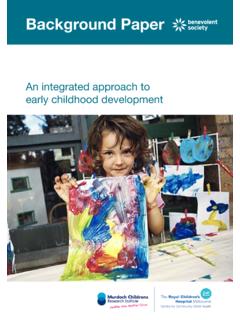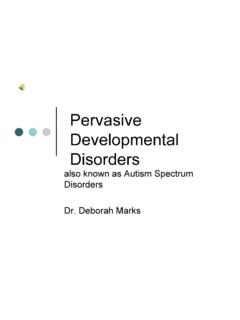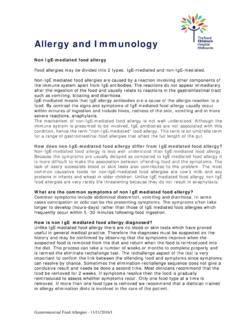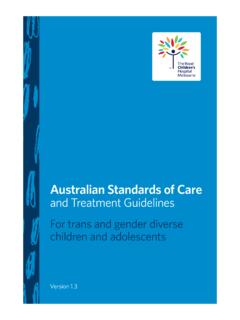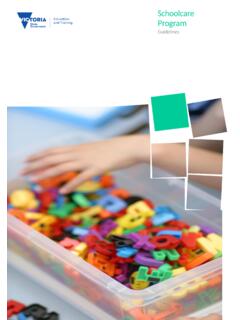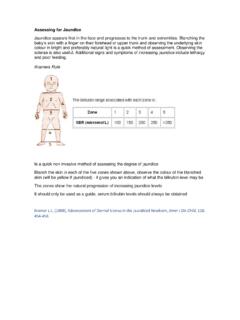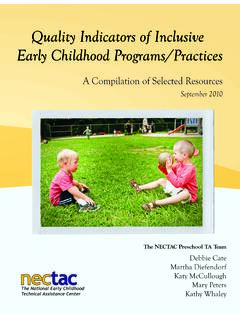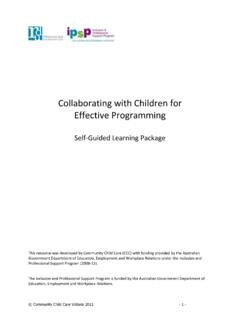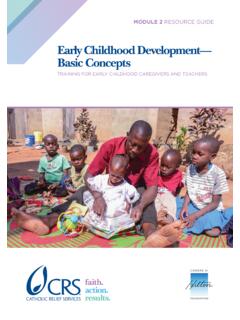Transcription of THE IMPACT OF EARLY CHILD DEVELOPMENT AND …
1 THE IMPACT OF EARLY CHILD DEVELOPMENT AND experience ON LATER OUTCOMES Tim Moore Maribyrnong EARLY Years AEDI Forum, Footscray, 6th June 2007 OUTLINE What do we know about the DEVELOPMENT of young children s brains? What are the key features of EARLY CHILD DEVELOPMENT ? What do we know about children s developmental trajectories? What is school readiness? Why is school readiness important? What can be done to improve children s readiness for school? Implications and conclusions CHILD DEVELOPMENT What do we know about the DEVELOPMENT of young children s brains? The brain governs all our functioning, not just our cognitive processes. Brain DEVELOPMENT is important for all aspects of DEVELOPMENT - physical, social, emotional and cognitive. Therefore, healthy brain DEVELOPMENT is a prerequisite for our future physical and mental health, our social relationships, and our functional real life skills, as well as our learning and academic achievements Most of the cerebral neurons we ever have develop during pregnancy - this growth starts at three weeks and is largely completed by 18-20 weeks.
2 The human brain has approximately 100 billion neurons these are produced at an average rate of over half a million per minute during the first four months of gestation. Unlike other tissues in the body, cerebral neurons do not divide any further once they are formed, which is why brain damage is so devastating since new neurons cannot be grown, we are dependent upon other parts of the brain taking over the functions of the damaged areas Children s brains are not mature at birth - although neuronal growth is completed during pregnancy, most synaptic growth occurs after birth. Synapse formation is a much more protracted slower process than neuron formation, commencing during pregnancy and continuing until well into the second year after birth. At its peak, around 15,000 synapses are produced on every neuron in the cortex which means they are being created at an average rate of million new synapses per second between two months of gestation and two years after birth.
3 The cerebral cortex triples in thickness during the first year of life. Brain DEVELOPMENT involves a process of synaptic pruning - the connections compete with one another, and the least useful die off. The reason why neurological DEVELOPMENT is not completely genetically determined is to allow the baby scope to learn: babies brains are learning machines - they build themselves, or adapt, to the environment at hand. Brain DEVELOPMENT also involves the progressive integration of different parts of brain. Most tasks involve collaboration between different areas of the brain, such as our cognitive and emotional systems. For this to happen, they need to communicate effectively with one another. EARLY exposure to toxic substances damages brain architecture. The immature brain is far more vulnerable to toxic exposures than that of an adult.
4 Mature brains have a barrier of cells that restrict the entry of chemicals from the bloodstream into brain tissue, but that protective barrier is absent in the fetus and only reaches maturity in the first year after birth. Thus, the time of greatest brain growth and most intensive construction of brain architecture is also the period that is most vulnerable to the relatively free passage of toxins into its cells. What are the key features of EARLY CHILD DEVELOPMENT ? Genes and experience interact to shape the architecture of the developing brain. Genes always have their effect in interaction with the environment - even if attributes are heritable, they can develop very differently in different environments. Different stages of DEVELOPMENT (eg. prenatal neurological DEVELOPMENT ) are more biologically determined than others (eg.)
5 Postnatal neurological DEVELOPMENT ). Children affect their environment as well as being affected by it, therefore playing an active part in their own DEVELOPMENT . The CHILD plays a part in shaping the experiences to which the CHILD 's mind must adapt. Through their behaviour and characteristics, they selectively reinforce (and thereby alter) the behaviour of their caregivers towards them. In this way, behaviour itself alters genetic expression, which then creates behaviour. Young children develop through their relationships with others. EARLY DEVELOPMENT is determined by the quality of their attachment experiences. Attachment is an inborn biological instinct that motivates an infant to seek closeness to caregivers and to establish communication with them. Attachment involves a relationship with a caregiver in which the immature brain uses the mature functions of the mature brain to organise its own processes.
6 It is based on collaborative communication: secure attachment results when the caregiver consistently perceives and responds to the CHILD 's mental states. Attachment relationships form the foundation for the DEVELOPMENT of the mind and the brain: human connections create neuronal connections. Relationships shape DEVELOPMENT and behaviour through neurobiological connections our brains talk to one another. Later DEVELOPMENT continues to be determined by the nature of relationships the brain can be reprogrammed through positive relationships. These programming and reprogramming processes involves two complementary aspects of brain functioning: hormonal and neurochemical reactions and mirror neurons. Hormonal / neurochemical reactions are involved in all aspects of brain DEVELOPMENT and functioning.
7 When we are babies, the positive looks and smiles we see in our parents trigger the release of pleasurable neurochemicals (opiates) that actually help the brain to grow. Mirror neurons are found in various parts of the brain and function to link motor action to perception: they fire if you watch someone else doing something intentionally, and will also fire if you do the same action. Mirror neurons enable the brain to detect the intention of another person, that is, to read other people s minds and emotional states. Children's emotional DEVELOPMENT is built into the architecture of their brains. Emotional DEVELOPMENT begins EARLY in life, is a critical aspect of the DEVELOPMENT of overall brain architecture, and has enormous consequences over the course of a lifetime. The foundations of social competence that are developed in the first five years are linked to emotional well-being and affect a CHILD 's later ability to functionally adapt in school and to form successful relationships throughout life.
8 There are many well-trodden pathways to misery. People may choose to eat too much or too little, drink too much alcohol, react to other people without thinking, fail to have empathy for others, fall ill, make unreasonable emotional demands, become depressed, attack others physically, and so on, largely because their capacity to manage their own feelings has been impaired by their poorly developed emotional systems. (Gerhardt, 2004) The core features of emotional DEVELOPMENT (or emotional intelligence ) are the ability to identify and understand one's own feelings, to accurately read and comprehend emotional states in others, to manage strong emotions and their expression in a constructive manner, to regulate one's own behaviour, to develop empathy for others, and to establish and sustain relationships.
9 The growth of self-regulation is a cornerstone of EARLY childhood DEVELOPMENT that cuts across all domains of DEVELOPMENT . It underpins the subsequent DEVELOPMENT of emotional and social competences, as well as the mastery of academic tasks and general life skills. EARLY experiences can influence later health and developmental outcomes through a process of biological embedding. This is a process whereby experiences are programmed into the structure and functioning of biological and behavioral systems, and set the CHILD on a developmental trajectory that becomes increasingly difficult to modify. Susceptibility to many adult diseases, including reproductive diseases and dysfunctions, is set in utero or neonatally as a result of the influences of nutrition and exposures to environmental stressors / toxicants Excessive stress disrupts the architecture of the developing brain.
10 Toxic stress in EARLY childhood is associated with persistent effects on the nervous system and stress hormone systems that can damage developing brain architecture and lead to lifelong problems in learning, behaviour, and both physical and mental health. Children whose relationships are insecure or disorganized have higher stress hormone levels which may alter the DEVELOPMENT of brain circuits and make them less capable of coping effectively with stress as they grow up. A history of chronic and severe trauma in EARLY childhood can result in alterations in fear-stress physiology and in brain DEVELOPMENT . Threat activates the brain s stress-response neurobiology, which then affects the DEVELOPMENT of the brain by altering the DEVELOPMENT and migration of neurons, the DEVELOPMENT of synaptic connections between neurons, and neurochemical differentiation.
